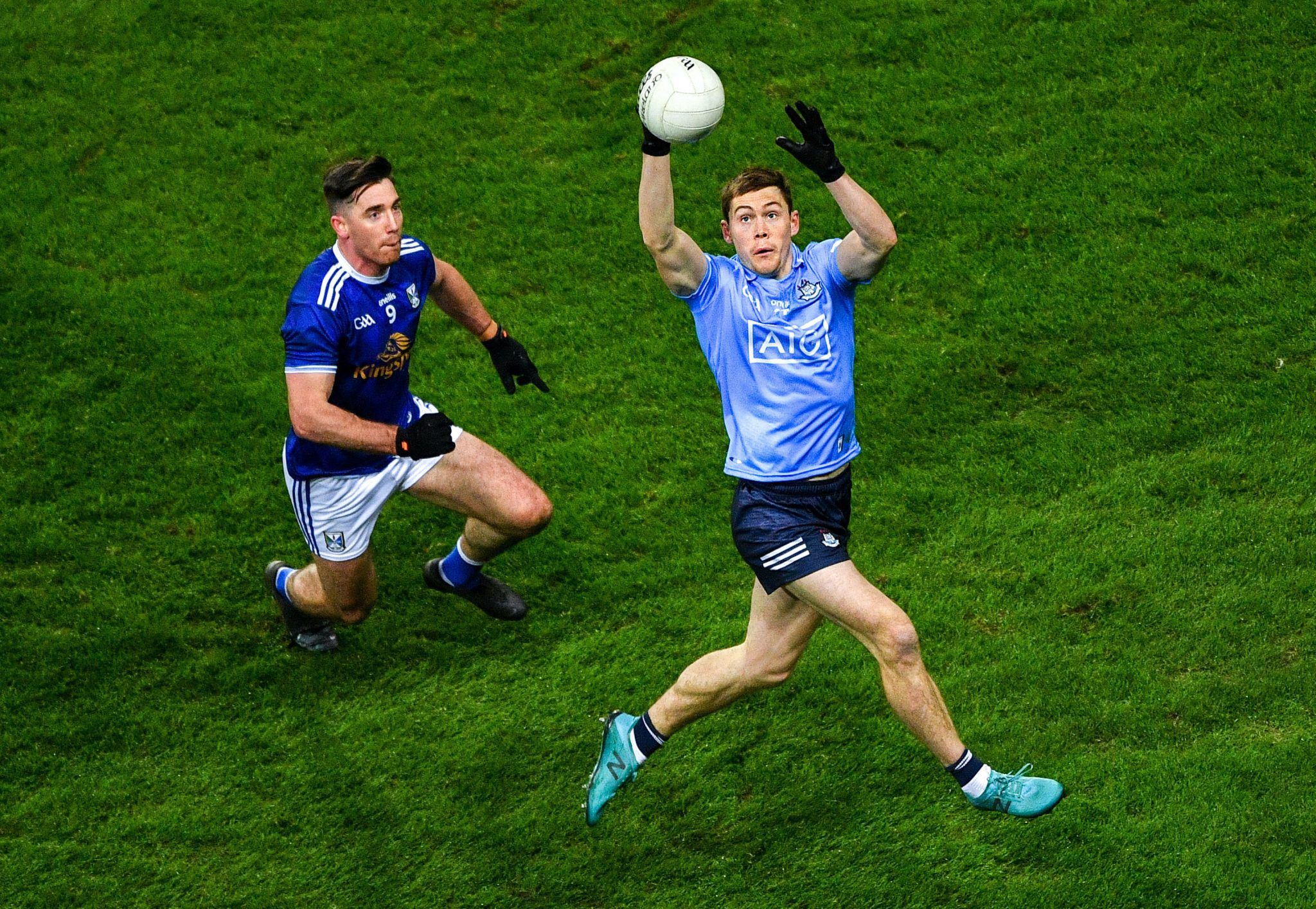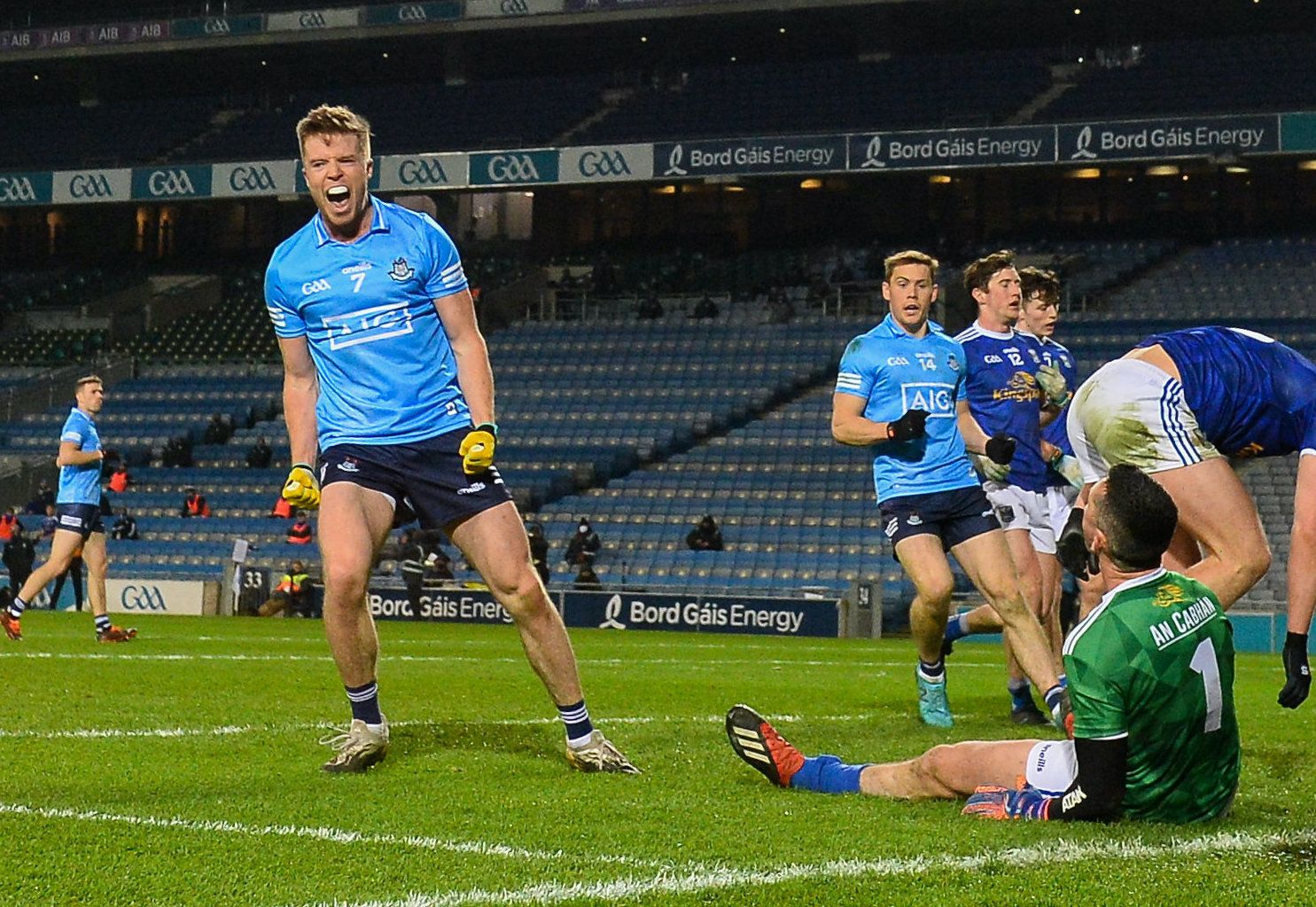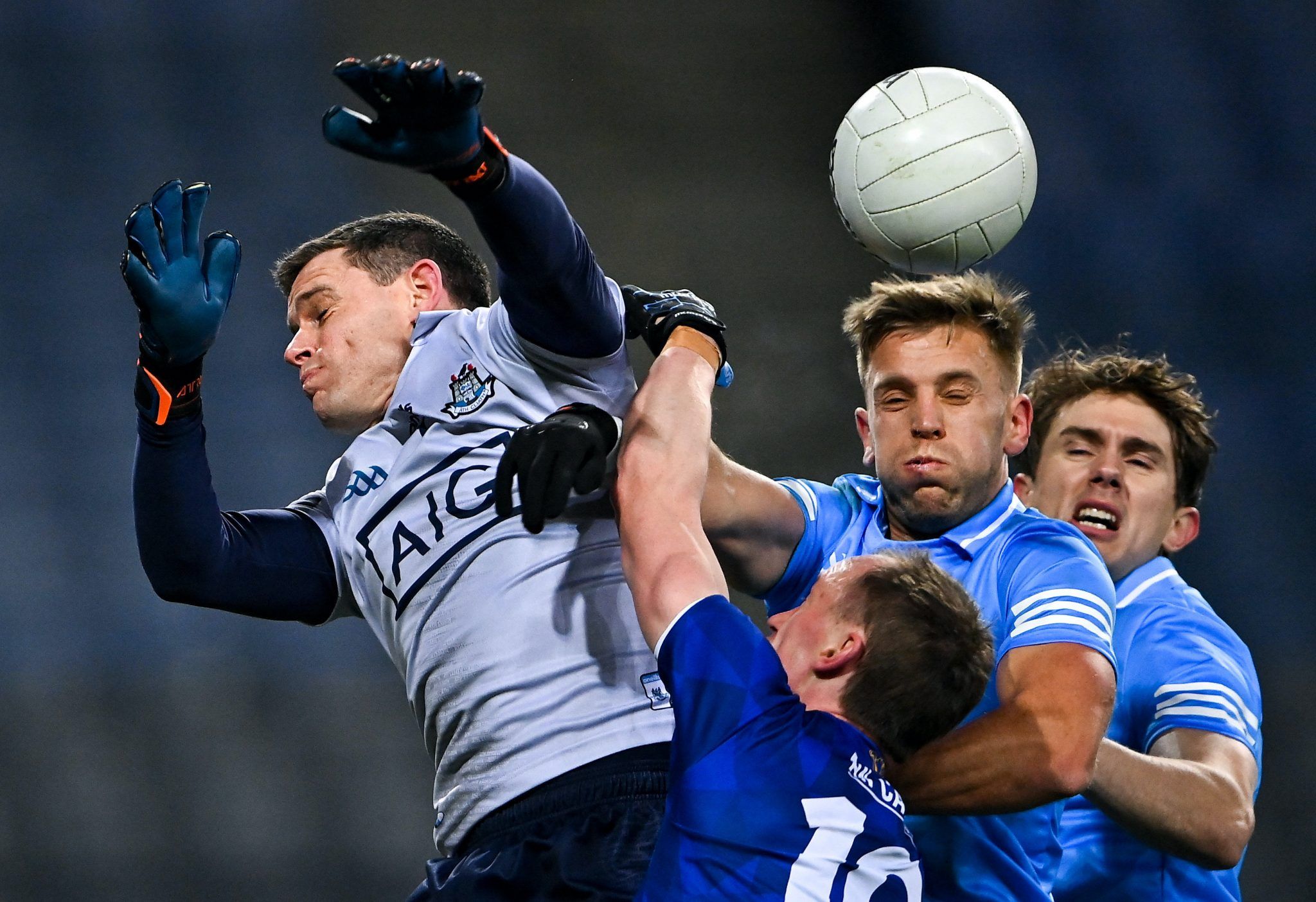

Share
5th December 2020
08:40pm GMT

"Mac," the call comes sharply from O'Callaghan. "Get out of there."McCarthy doesn't hesitate. He defers totally to the attacking nous of the man who was once a breakthrough star. Now in his fifth season with Dublin, O'Callaghan outranks McCarthy this far up the pitch. McCarthy breaks into a stride back down the pitch, closer to the action and, in an instant, O'Callaghan jinks left into the empty space and bursts right to win the ball on the other flank. The Dublin four all come alive.
 James McCarthy might not hold as much authority in those territories as O'Callaghan does but Dean Rock has a few more notches on his belt.
Sometimes you wonder how a collection of players can keep going so hard for so long in the face of such success and, honestly, you'd nearly be forgiven for scoffing at the talk that was coming out of the camp over the years about setting their own standards by simply - and continuously - trying to improve themselves as footballers regardless of what stage they were at and how many medals they had won.
But during the Laois game, 68 minutes on the clock and Dublin 18 points up, Paul Mannion cut inside his defender and did the most natural thing in the world for these well-drilled players; he played it to the man in a better position. Ciaran Kilkenny came running off him bearing straight down on goal so Mannion passed up the point and flicked it to the runner. Kilkenny? He flicked it over the bar with a hand pass and Mannion threw his head in the air. As Kilkenny came running out, Mannion wouldn't let it go. He queried the decision, what was that about, you were through. He could've taken the point after all.
19 points in front or 21 points in front wasn't the issue. The only concern of theirs was the right thing to do. The goal was on. The goal was passed up. In that instance, for this team, it wasn't good enough.
Tonight, 55 minutes gone, Dublin nine points to the good, Con O'Callaghan powers through and taps over. 10 points, 15 minutes left, All-Ireland final in two weeks.
Dean Rock isn't happy.
He stands with his hands extended and another shout is heard from the pitch.
James McCarthy might not hold as much authority in those territories as O'Callaghan does but Dean Rock has a few more notches on his belt.
Sometimes you wonder how a collection of players can keep going so hard for so long in the face of such success and, honestly, you'd nearly be forgiven for scoffing at the talk that was coming out of the camp over the years about setting their own standards by simply - and continuously - trying to improve themselves as footballers regardless of what stage they were at and how many medals they had won.
But during the Laois game, 68 minutes on the clock and Dublin 18 points up, Paul Mannion cut inside his defender and did the most natural thing in the world for these well-drilled players; he played it to the man in a better position. Ciaran Kilkenny came running off him bearing straight down on goal so Mannion passed up the point and flicked it to the runner. Kilkenny? He flicked it over the bar with a hand pass and Mannion threw his head in the air. As Kilkenny came running out, Mannion wouldn't let it go. He queried the decision, what was that about, you were through. He could've taken the point after all.
19 points in front or 21 points in front wasn't the issue. The only concern of theirs was the right thing to do. The goal was on. The goal was passed up. In that instance, for this team, it wasn't good enough.
Tonight, 55 minutes gone, Dublin nine points to the good, Con O'Callaghan powers through and taps over. 10 points, 15 minutes left, All-Ireland final in two weeks.
Dean Rock isn't happy.
He stands with his hands extended and another shout is heard from the pitch.
"Con, get your head up."It's not about the lead and it's not about Con O'Callaghan's tally. There and then, the opportunity was a green flag and, there and then, it was a challenge they didn't meet.
 Whilst the rest of the country will discuss with good reason about the gap and what to do with the Dublin monster, perhaps one of the grimmest realisations is that, when all that is happening, this team will just be watching the video next week dissecting those goal chances they missed and reminding each other of what is and isn't good enough.
Where you thought Jim Gavin was key to keeping their feet on the ground and their minds focused solely on 'the process', the relentless drive for self-improvement goes beyond one man at the top now and it goes beyond one season or any one number you want to put on Sam Maguire titles.
It wouldn't change much anyway because the team is better than the rest, the squad and beyond is infinitely better and there are a lot of advantages that come along with being Dublin now but it certainly doesn't help that none of them have any interest in taking their foot off the gas, not even for one attack in another dead and buried contest.
The national conversation once again this weekend will be that Dublin are too good, and that someone needs to intervene. The Dublin conversation this week will be that each of them need to do something about getting even better.
Whilst the rest of the country will discuss with good reason about the gap and what to do with the Dublin monster, perhaps one of the grimmest realisations is that, when all that is happening, this team will just be watching the video next week dissecting those goal chances they missed and reminding each other of what is and isn't good enough.
Where you thought Jim Gavin was key to keeping their feet on the ground and their minds focused solely on 'the process', the relentless drive for self-improvement goes beyond one man at the top now and it goes beyond one season or any one number you want to put on Sam Maguire titles.
It wouldn't change much anyway because the team is better than the rest, the squad and beyond is infinitely better and there are a lot of advantages that come along with being Dublin now but it certainly doesn't help that none of them have any interest in taking their foot off the gas, not even for one attack in another dead and buried contest.
The national conversation once again this weekend will be that Dublin are too good, and that someone needs to intervene. The Dublin conversation this week will be that each of them need to do something about getting even better.
 There are enough difficulties that come with trying to impose your own game on Dublin but with their pressure on kickouts, the way they meet defenders high up the pitch and then the way they take you into places they want you, Dublin usually just keep teams reacting and, usually, they get them to react exactly how the way.
So as much as their pool, their skills, their athleticism are all above everyone else, the traps that go along with all that just suck the life out of teams.
One thing that gets the Dublin backroom team animated and vocal - and not much generally does - is the prospect of a double up on the man on the ball. For the most part, the Dublin management keep their counsel, but the second there's a hint of a double up, you hear the excited roar over and over.
There are enough difficulties that come with trying to impose your own game on Dublin but with their pressure on kickouts, the way they meet defenders high up the pitch and then the way they take you into places they want you, Dublin usually just keep teams reacting and, usually, they get them to react exactly how the way.
So as much as their pool, their skills, their athleticism are all above everyone else, the traps that go along with all that just suck the life out of teams.
One thing that gets the Dublin backroom team animated and vocal - and not much generally does - is the prospect of a double up on the man on the ball. For the most part, the Dublin management keep their counsel, but the second there's a hint of a double up, you hear the excited roar over and over.
"Two on one! Two on one!"If you're the man closest to the marker and the opposition player, you're jolted into action. If nothing else, being caught ball-watching in the analysis sessions wouldn't go down well in a team picking apart another 15-point hammering. The two on one defence is often manufactured though and it's easy to fall into it. Watch for it. A player is coming out of defence in the opposition team and he's basically sheep-dogged into the flanks. The killer here is that there's space there initially, more than there looks inside, so he goes for it with good, positive intentions and that's when he's trapped. For a start, he's never going to lose the man he's taking on - Dublin are too fit and too disciplined to beat in a foot race so he's running under pressure from the off. But the angle of that pressure is fascinating. Rarely will that same Dublin player commit so much to a challenge that he'll lose his position. The most important thing is to not let that man in possession to get inside at this stage because that's where the play can be opened up, that's where there are more options and that's where there's a bigger space that Dublin can't trap you so easily. So the Dublin player will shadow him accordingly and continue to show him the wing. He's on one side, the sideline is on the other and, eventually, the ball-runner is going to meet another blue jersey head on - a bigger one. He can't get inside because of the angle of the initial pressure. He's been shown nothing but the wing so his only other choice is to finally turn back down that same straight line he's been sprinting up and bang... another Dub is in on the plan and the man with the ball is surrounded and isolated with three men who are using the sideline as a fourth defender.
 Sideline ball, overcarrying or turnover; choose your poison. Dublin win the ball in your own half and their demoralising accuracy punishes it every time.
It's easier said than done trying to find a chink in that armour - we have six years of evidence that shows very little works.
But what was striking and a little disappointing was the lack of interest Cavan or their bench had in attacking the Dublin kickout. There was relatively no pressure and no structure other than players loosely picking up their men and nothing stopping Cluxton tapping it to Johnny Cooper whenever he wanted to.
Only Martin Reilly was a real vocal presence throughout the game and the most sense he spoke was in the first half after Oisin Kiernan kicked a bad high ball that sailed a long way wide - that was one of two long balls they tried in the first half, one of which they won a free that was scored and Cooper was relieved and lucky there was no further punishment.
So Reilly looked out at Kiernan after one half of those balls in drifted out of play and he gave him one simple instruction.
Sideline ball, overcarrying or turnover; choose your poison. Dublin win the ball in your own half and their demoralising accuracy punishes it every time.
It's easier said than done trying to find a chink in that armour - we have six years of evidence that shows very little works.
But what was striking and a little disappointing was the lack of interest Cavan or their bench had in attacking the Dublin kickout. There was relatively no pressure and no structure other than players loosely picking up their men and nothing stopping Cluxton tapping it to Johnny Cooper whenever he wanted to.
Only Martin Reilly was a real vocal presence throughout the game and the most sense he spoke was in the first half after Oisin Kiernan kicked a bad high ball that sailed a long way wide - that was one of two long balls they tried in the first half, one of which they won a free that was scored and Cooper was relieved and lucky there was no further punishment.
So Reilly looked out at Kiernan after one half of those balls in drifted out of play and he gave him one simple instruction.
"Put it on top of the 'keeper."They never did. Not until the second half anyway and it caused panic alright but Dublin dealt with it eventually, if a little unconvincingly. And they didn't have to deal with it again.
 They've now beaten Westmeath by 11, Laois by 19, Meath by 21 and the Ulster champions by 15.
They're in a sixth All-Ireland final in succession without a bruise on them, not even any kind of aerial onslaught from Cavan to deal with.
For a fourth game in this championship, they've had no real questions to answer.
The only question each of them have to answer again will be from themselves.
And all they'll be asking is one thing. One truly depressing thing for everyone else. How can they do it even better the next time?
They've now beaten Westmeath by 11, Laois by 19, Meath by 21 and the Ulster champions by 15.
They're in a sixth All-Ireland final in succession without a bruise on them, not even any kind of aerial onslaught from Cavan to deal with.
For a fourth game in this championship, they've had no real questions to answer.
The only question each of them have to answer again will be from themselves.
And all they'll be asking is one thing. One truly depressing thing for everyone else. How can they do it even better the next time?
Explore more on these topics: